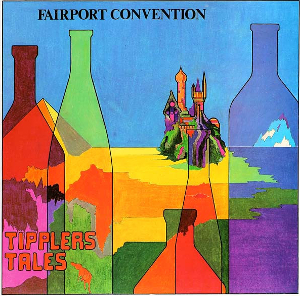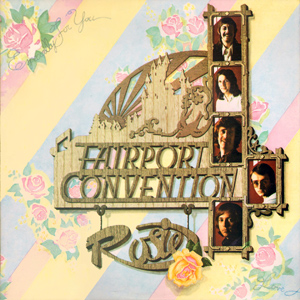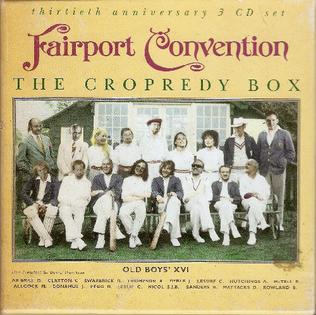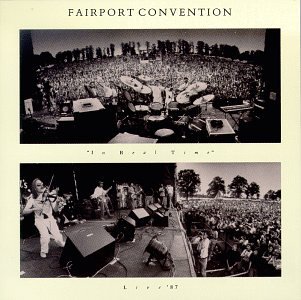
Fairport Convention are an English folk rock band, formed in 1967 by guitarists Richard Thompson and Simon Nicol, bassist Ashley Hutchings and drummer Shaun Frater. They started out influenced by American folk rock, with a set list dominated by Bob Dylan and Joni Mitchell songs and a sound that earned them the nickname "the British Jefferson Airplane". Vocalists Judy Dyble and Iain Matthews joined them before the recording of their self-titled debut in 1968; afterwards, Dyble was replaced by Sandy Denny, and Matthews later left during the recording of their third album.

Dave Pegg is an English multi-instrumentalist and record producer, primarily a bass guitarist. He is the longest-serving member of the British folk rock band Fairport Convention and has been bassist with a number of folk and rock groups including the Ian Campbell Folk Group and Jethro Tull.

Full House is a 1970 album by British folk rock group Fairport Convention, their fifth since their debut, Fairport Convention in 1968, and their first without a female vocalist.

Simon John Breckenridge Nicol is an English guitarist, singer, multi-instrumentalist and record producer. He was a founding member of British folk rock group Fairport Convention and is the only founding member still in the band. He has also been involved with the Albion Band and a wide range of musical projects, both as a collaborator, producer and as a solo artist. He has received several awards for his work and career.

Gladys' Leap is the fourteenth studio album by Fairport Convention, released in August 1985. It was recorded in April and May 1985 at Woodworm Studios, Barford St. Michael, Oxfordshire, UK. It was produced and engineered by Simon Nicol, Dave Mattacks and Dave Pegg and the assistant engineers were Tim Matyear and Mark Powell. The album features the first contributions to a Fairport album by founding member Richard Thompson since Rosie in 1973. Thompson wrote the opening track "How Many Times" and played lead guitar on "Head in a Sack".

Tipplers Tales is a 1978 album by Fairport Convention, the band's thirteenth studio album since their debut in 1968. Recorded in only ten days, it was the last album the band recorded for Vertigo. Simon Nicol later wrote
"We secured a deal with Vertigo, the one that ended up with them paying us not to make records. It seemed a novelty, like that Marx Brothers line: "How much for you NOT to rehearse?" "Oh, you can't afford it." We did Bonny Bunch and Tipplers Tales then didn't make the other four contracted albums"

Live at the L.A. Troubadour along with its reissued counterpart House Full are the only live Fairport Convention albums recorded while Richard Thompson was a full-time band member. It was recorded in 1970 on the Full House tour and was reissued in 1986 and again in 2007, with modifications. Seven of the eight tracks are available on the House Full album with one being found only on this album.

House Full: Live at the L.A. Troubadour not to be confused with its earlier counterpart Live at the L.A. Troubadour is the only currently available live Fairport Convention album to feature Richard Thompson as a band member.

Moat on the Ledge: Live at Broughton Castle, August '81 is a live folk rock album by Fairport Convention. The album was produced by Simon Nicol and Dave Pegg.

Rising for the Moon is the tenth studio album by the British folk rock band Fairport Convention, released in 1975. It reached number 52 in the UK albums charts. This was the last Fairport album to feature vocalist Sandy Denny.

Angel Delight is the sixth album by the British folk rock band Fairport Convention, released in June 1971. This was the first Fairport Convention album without guitarist Richard Thompson, and the lineup consisted of Simon Nicol, Dave Swarbrick, Dave Pegg, and Dave Mattacks (drums).

Nine is a 1973 album by the British folk rock group Fairport Convention. It is their ninth album since their debut in 1968, and the second to include Trevor Lucas and Jerry Donahue. No original members of Fairport Convention were involved in making the album. According to AllMusic, it is the band's most uneven album.

Rosie is a 1973 album by British folk rock band Fairport Convention, their eighth album since their debut in 1968.

Fairport Live Convention is a 1974 live album by British folk rock band Fairport Convention originally released in 1974 by Island Records. It was recorded live at the Sydney Opera House, the London Rainbow and the Fairfield Halls, Croydon by John Wood and mixed down at Sound Techniques, London. It was produced by Trevor Lucas & John Wood.

The Cropredy Box is an album by Fairport Convention recorded at their annual live concert in Cropredy, Oxfordshire, England to celebrate the band's thirtieth anniversary in 1997. Featuring many songs for which the band had become noted, the set also features performances from many former members including violinist Dave Swarbrick, original vocalist Judy Dyble, and Ralph McTell. Commentary is provided by their first manager, Joe Boyd, and Ashley Hutchings.

Gottle O'Geer is the eleventh studio album by English folk rock band Fairport Convention. The album was released through Island Records in May 1976.

In Real Time: Live '87 is a 1987 album by British folk rock band Fairport Convention. Although appearing to consist of recordings of concert performances, the album was largely recorded at The Mill studio, Farnham, Surrey, with audience responses dubbed on later, reputedly taken from a recording of a John Martyn concert.

Old New Borrowed Blue is the nineteenth studio album by folk rock band Fairport Convention, although for this release, they were billed as "Fairport Acoustic Convention" as it was the band's first all-acoustic album in 29 years. Part studio, part live, it was recorded to publicise a tour of the United States and consisted of cover versions, new songs and classic tracks dating back to the band's early career. Dave Mattacks, who had provided drums and electronic instrumentation for previous albums, was absent.

Live at the BBC is a 2007 compilation album by British folk rock band Fairport Convention. It consists of tracks recorded for the BBC for various radio programmes between 1968 and 1974 and comprises four CDs in a fold-out package with a fifty-page booklet including song lyrics and numerous contemporary photographs.



















